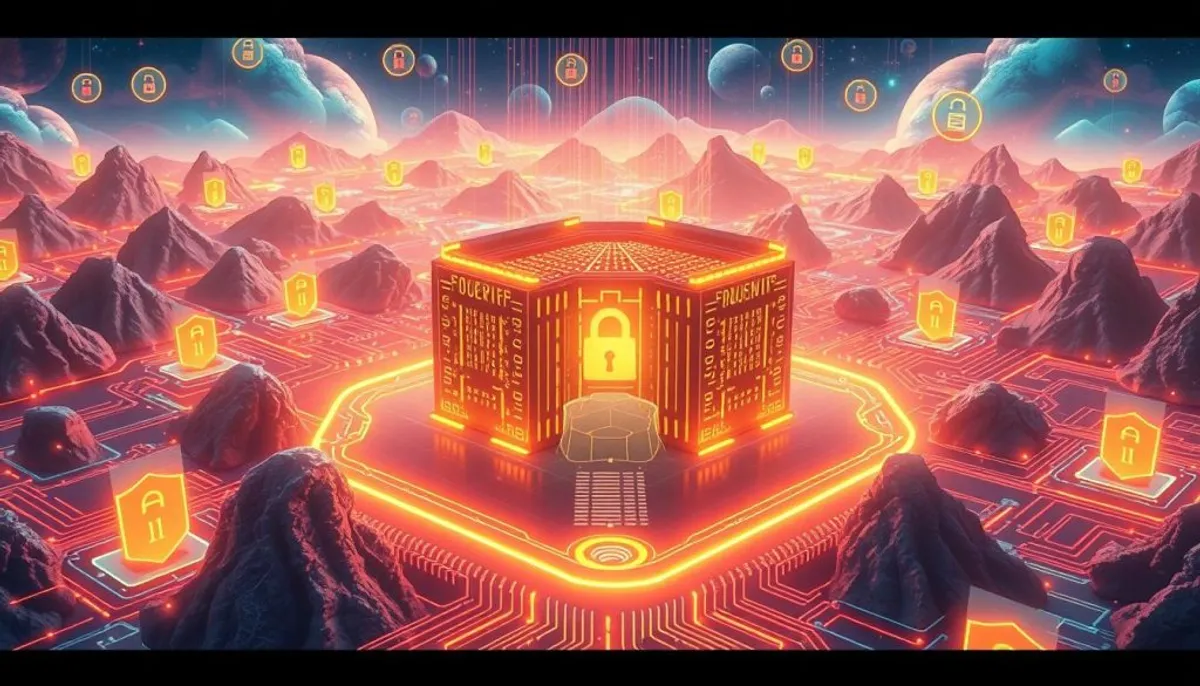In today’s world, we share our most private info online. Cybersecurity is now a must-have. The cost of cybercrime is expected to hit $10.5 trillion by 2025. This shows how vital it is to keep our online lives safe.
Cybersecurity is like a shield for our digital stuff. It keeps our important online assets safe from threats. This article will talk about why cybersecurity matters, what dangers we face online, and how to make our digital lives safer.

Key Takeaways
- Cybersecurity is key to keeping our personal and business data safe in today’s digital world.
- Cybercrime is getting worse, with costs expected to hit $10.5 trillion a year by 2025.
- It’s important to know about common threats like malware, phishing, and ransomware to protect ourselves.
- Using strong passwords, keeping software updated, and using multi-factor authentication can really help keep our digital info safe.
- Backing up our data and having a plan to recover it is crucial to avoid losing important information and keep our businesses running smoothly.
The Importance of Cybersecurity in Today’s Digital World
Our lives are more digital now, making personal data security and online privacy key. Threats like identity theft, fake financial deals, and cyber stalking are real risks. Businesses must protect customer data, keep their intellectual property, and keep their trust and reputation safe.
Personal Privacy and Protection
Today, our personal info is at risk from many cyber threats. Identity theft can destroy our finances and harm our personal data security. Cyberstalkers use digital tools to invade our online privacy, causing us distress. Keeping our digital life safe is crucial for our well-being.
Business Data Security and Trust
Businesses also struggle to keep their digital info safe and earn customer trust. A data breach can ruin a company’s reputation and disrupt its work. Keeping customer data and intellectual property safe is essential for trust and reputation.
Cybersecurity is crucial for our digital world. It protects our personal data security, online privacy, and the financial security of businesses and people. As we deal with a complex digital world, we see how important cybersecurity is.
Understanding Cyber Threats
In today’s world, cybersecurity threats are a big worry. Malware, viruses, phishing, spear-phishing, and ransomware are some ways cybercriminals attack. Knowing about these threats helps us defend against them.
Malware and Viruses
Malware, like viruses and trojans, can harm your devices. They can damage files, watch what you do online, and let others into your systems. This lets cybercriminals start more dangerous attacks.
Phishing and Spear-Phishing Attacks
Phishing and spear-phishing tricks people into giving away sensitive info or clicking bad links. Scammers pretend to be from trusted places to get you to share your login details or other personal stuff.
Ransomware
Ransomware locks up your files and demands money to unlock them. These attacks can really slow down businesses and individuals by taking away important data. The crooks behind these attacks want payment in cryptocurrency, making it hard to track and get back the stolen money.
It’s key to know about cyber threats to keep your digital life safe. By staying updated and using strong security, you can lower the risks from these bad actors. This helps protect your personal and work data.
The Challenges of Cybersecurity
Defending against evolving cyber threats is tough. Cybersecurity experts have to keep up with new threats all the time. They must always be ready to adapt and stay one step ahead.
Attackers keep coming up with new ways to get past threat detection and vulnerability assessment. It’s like a never-ending game of cat and mouse. Security teams must always be on their toes.
Human error and insider threats can also lead to cyber attacks. Simple mistakes or actions by insiders can weaken even strong security. Social engineering tricks people into sharing sensitive info or giving up access control.
The digital world is getting bigger with more devices and networks. This makes it harder to keep everything secure. Cybersecurity needs technical skills, flexibility, and a strong focus on awareness among everyone.

Cybersecurity Best Practices
In today’s digital world, keeping your online space safe is crucial. By following simple cybersecurity tips, you can boost your digital safety. Things like strong passwords and keeping software updated can help protect your data from cyber threats.
Fortify Your Passwords
Using strong, unique passwords is key to online safety. Don’t pick easy-to-guess words. Instead, mix letters, numbers, and symbols. Tools like password managers can help you keep track of these secure passwords.
Stay Up-to-Date with Software Updates
Keeping your software and systems updated is vital. These updates often fix security holes, keeping your devices safe from threats. It’s a simple step that can make a big difference.
Embrace Multi-Factor Authentication
Adding multi-factor authentication (MFA) to your accounts adds an extra layer of security. It makes it harder for hackers to get into your private info. Use something like a code or a scan to verify your identity.
Cultivate Phishing Awareness
Being careful with phishing scams is important. Learn to spot fake emails and websites. Teach yourself and others how to spot these scams to protect against data theft and financial loss.
Backup Your Data Regularly
Backing up your data is crucial for keeping your information safe. Save your files both on your device and in the cloud. This way, you can recover your data if something goes wrong, keeping your work and personal info secure.
Following these cybersecurity tips can make your online space safer. It helps reduce the risk of cyber attacks and keeps your data safe. Making these steps a priority is key to protecting your digital life.
Strong Password Management
In today’s digital world, managing your passwords well is key to staying safe online. Your passwords protect your online accounts. It’s important to make them strong and unique to keep your digital identity safe.
Creating Unique and Complex Passwords
To boost password security, make sure each account has a unique and complex password. Don’t use easy-to-guess info like birthdays or pet names. Instead, mix uppercase and lowercase letters, numbers, and symbols. This makes your passwords harder for hackers to guess.
Using Password Managers
Creating strong passwords is important, but remembering them can be hard. That’s where password managers help. These tools can make, keep, and find your passwords. They make managing your passwords and protecting your accounts easier. With a password manager, you can have strong, unique passwords for all your accounts without remembering them all.
Using these password security tips every day helps protect your online life and private info from hackers.
Software Updates and Patches
In today’s digital world, keeping your devices and software safe is key. Software updates often bring important security patches to fix vulnerabilities. These updates are like closing doors for cybercriminals, making your digital space safer.
Managing vulnerabilities is a big part of staying safe online. By quickly applying software updates and security patches, you lower the chance of your systems getting hacked. Many software companies offer automatic updates to make this easier, keeping your system protection current.
It’s important to keep your devices and apps updated in today’s complex digital world. By understanding the value of software updates and security patches, you protect your online life. This keeps your computing safe and strong.
| Benefit | Description |
|---|---|
| Vulnerability Management | Promptly applying software updates and security patches to address known vulnerabilities and reduce the risk of successful cyber attacks. |
| Improved System Protection | Ensure your devices and software are equipped with the latest security features and defenses against emerging threats. |
| Enhanced Reliability | Regular software updates often include bug fixes and performance improvements, leading to a more stable and reliable computing experience. |
By valuing software updates and security patches, you keep your digital life safe. This ensures a secure and strong computing environment.
Multi-Factor Authentication (MFA)
In today’s world, we face many cyber threats. That’s why multi-factor authentication (MFA) and two-factor authentication (2FA) are key to keeping your online accounts safe. These methods add extra security, making it tough for hackers to get into your accounts, even with your password.
MFA and 2FA ask for a second proof of who you are, like a code on your phone or a scan of your face. This makes sure only you can get into your accounts. It helps protect your account security, access control, and identity verification.
- Multi-factor authentication (MFA) uses more than one way to check who you are, like a password, a code, or a scan of your face.
- Two-factor authentication (2FA) is a type of MFA that needs two different things to prove who you are, like a password and a code.
- Using MFA or 2FA can greatly lower the chance of someone else getting into your online accounts, even if they have your password.
Turning on MFA or 2FA for your important accounts is a smart move to protect your digital life. Multi-factor authentication is a strong defense against cybercrime. It adds an extra layer of safety, giving you peace of mind in our digital world.
Phishing Awareness and Prevention
Phishing and spear-phishing attacks are now common and tricky threats online. They use fake emails or messages to get sensitive info or trick you into clicking bad links. It’s key to spot suspicious emails and links and check if the sender is real to keep your online world safe.
Identifying Suspicious Emails and Links
Knowing what phishing emails look like can help protect you. Watch out for emails that rush you, ask for personal info, or have weird attachments or links. Always check the sender’s email and the link’s URL before clicking.
Verifying Sender Legitimacy
Phishers often pretend to be trusted people or companies to seem real. To fight this, always check the sender’s identity through other ways before you act or share info. This means calling the company or person directly using their real contact info, not what’s in the suspicious email.
Being careful with unknown or suspicious messages is key to keeping your online life safe from phishing and other threats. By staying alert and making smart choices, you can keep your email security and link verification safe. This also helps make sure the sender authentication of trusted sources is secure.
Data Backup and Recovery
In today’s world, cyber threats keep getting worse. That’s why keeping up with regular data backups is key. These backups act as a shield for your important info. They make sure your data stays safe and easy to get back, even if you face a cyber attack like ransomware.
The Importance of Regular Backups
Backing up your data is like having a safety net for your digital stuff. If you lose data due to a cyber attack, hardware failure, or mistake, a recent backup can save the day. It helps you get your info back fast and lessens the damage. A good backup plan keeps your files, money records, and other important stuff safe from data loss.
Testing Backup Integrity
Just making backups isn’t enough; you must check they work right. Testing your backups often can spot problems like incomplete or damaged data. This lets you fix issues before disaster hits. Having a solid backup and recovery plan means you can rest easy, knowing your data is safe and ready when you need it.
Having a strong data backup and recovery plan is like having a safety net for your digital life. It shields you from many cyber threats and lessens the blow of data loss or disaster recovery situations. By checking your backups often and making sure they’re good, you can be sure your important data is safe and ready when you need it.

| Backup Strategy | Description | Advantages |
|---|---|---|
| Local Backups | Storing data on external hard drives or network-attached storage (NAS) devices within your home or office | Easily accessible, cost-effective, and can be done manually or automated |
| Cloud Backups | Storing data on remote servers maintained by cloud storage providers | Offsite storage, automatic synchronization, and accessibility from any device with an internet connection |
| Hybrid Backups | Combining local and cloud-based backup solutions for added redundancy and flexibility | Leverages the benefits of both local and cloud backups, providing a comprehensive data protection strategy |
Cybersecurity and National Security Implications
Cybersecurity is more than just protecting personal info or company data. It’s also about keeping our country safe. Cyber attacks can hit things like power grids, transport systems, and communication networks. This can lead to big problems for our safety and well-being.
Stopping these threats needs work from around the world. Governments, policy makers, and security teams must work together. They need to make strong cybersecurity rules, build global partnerships, and teach people about online safety.
The link between cybersecurity and national security is getting more complicated. Cyber wars and attacks on key systems are big problems. We need to work harder to protect our important infrastructure and join forces with other countries on cyber policy issues.
| Cybersecurity Challenge | National Security Implication |
|---|---|
| Disruption of critical infrastructure | Widespread disruption and potential compromise of national security |
| Cyber warfare and cyber attacks | Threats to national security, military operations, and strategic decision-making |
| Lack of international collaboration | Difficulty in coordinating a unified response to global cyber threats |
We need a strong, team effort to tackle these issues. Governments, security teams, and the private sector must work together. By focusing on cybersecurity and national security, we can make our critical systems stronger. This helps keep our societies safe from new cyber threats.
Conclusion
Our digital lives are now a big part of our everyday. That’s why cybersecurity is so important. We need to protect our personal info, keep business data safe, and make sure critical systems work well. By understanding the changing cyber threat landscape, using best practices, and spreading cybersecurity awareness, we can make the digital world safer and more secure.
Dealing with cyber threats is an ongoing fight. But if we stay alert and keep improving our defenses, we can feel safe in the digital world. As technology changes our lives, the need for digital safety and cyber resilience will increase. This makes online protection key for the future of cybersecurity.
By working together and being proactive, we can strengthen our digital armor. This way, we can enjoy the good things technology brings without worrying about cyber attacks and data breaches. Let’s make a safer and better digital world for all, for now and the future.
RelatedRelated articles

